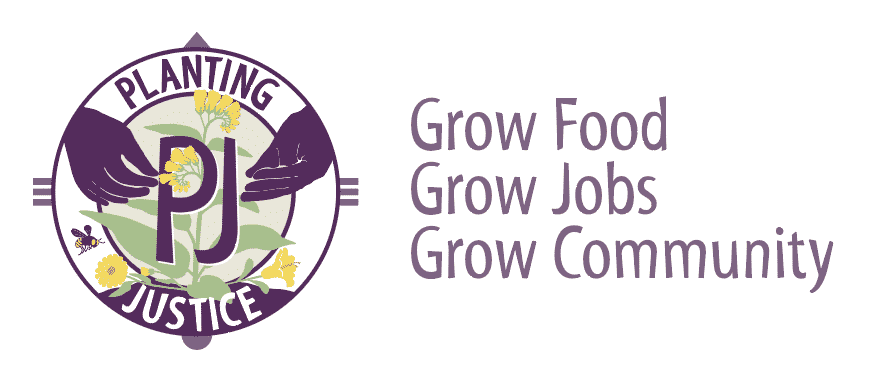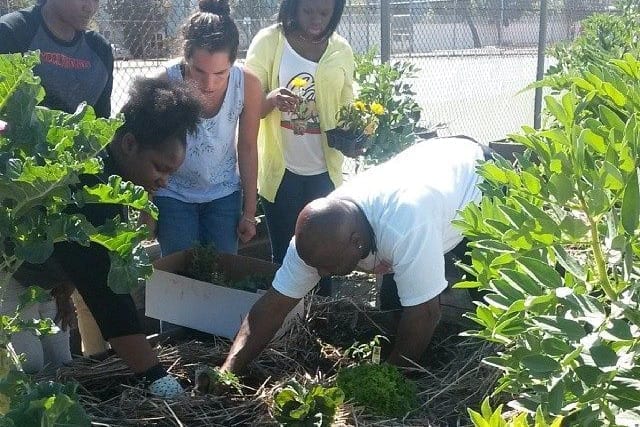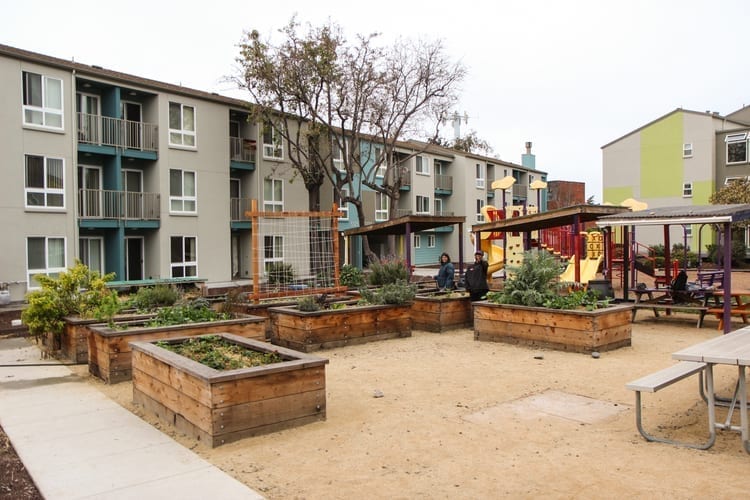Food Justice Education
How Our Program Works
The Education Program activates people most directly impacted by poverty and food injustice to create a more local and sustainable food system by developing their skills in ecological design, nutrition education, and multimedia arts that ground and connect urban gardens with local and international struggles and movements for social justice.
The work of the Education program takes place at high schools, prisons/jails/juvenile detention facilities, on our 4-acre farm in El Sobrante, at our 2-acre Nursery site in the Sobrante Park neighborhood of East Oakland, in partnership with community service providers, through local and regional bus tours, our internal workplace justice trainings, and sliding scale workshops for the general public.
Our students transform underused community spaces into edible gardens at each of these sites, to provide fresh and nutritionally dense food while developing their literacy in social justice movements, ecology, and holistic wellness. We hire staff directly from the communities we serve, and they develop important mentorship opportunities with our students through consistent weekly programming. Planting Justice Educators and community allies have developed the Plant! Cook! Organize! curriculum, available online soon.
A unique, empowering curriculum self-designed by Planting Justice Educators and allies:
Plant, Cook, Organize!
Discover the Lesson Plans:
What is the Food System?
An activity that invites participants to learn about the modern industrial food system, from production, processing, distribution, consumption to waste. Small groups explore what is involved in each part of the food system, who does the labor and who profits, and how we can make it more just and sustainable. Once participants have shared their findings, together they create a power map and organize a campaign for change. This lesson is paired with making kale smoothies, a nutritious way to practice decolonizing our diets.
Survival Pending Revolution: The Black Panther Party's 10 point program
Intro to Permaculture Design
Companion Planting: Diversity Builds Resiliency
Healing Justice - Remedies from the Garden
Participants spend time in the garden, harvesting and sharing knowledge about different plant remedies. They also learn more about the medical industrial complex and movements for healing justice.
An Ode to the Land: Poetry, Salad & Farmworker Rights
Pesticides are Poison: Practicing Integrated Pest Management
Peace and Peanuts: Practicing Mindfulness and Cover Cropping
People Before Profits: Making Vitamin Water from the Garden
Honoring our Roots: An Historical Timeline of Food Justice
Ongoing Projects
Fremont High School
4610 Foothill Blvd, Oakland, CA 94601
Planting Justice led weekly workshops at Fremont High School from September 2010 until May 2018. The garden was built and maintained by current and former students and had 10 raised beds, 8 fruit trees with an understory of perennial berries and herbs, a three-bin composting system, and dope mural. Planting Justice first partnered with Pamela Zimmerman’s art class when it was still Mandela High School. The following school year we began working in the afterschool program, offering juniors and seniors academic credit for their ongoing participation. Then we started partnering on a weekly basis with teachers on campus, including Patricia Arabia, for students to explore food justice issues, learn simple nutritious recipes, and practice permaculture design in their organic garden on campus. We then worked with the Latino Men and Boys program to help these young men build their leadership skills, reconnect with the earth, and develop their entrepreneurial projects. Fremont High School is currently under reconstruction and unfortunately, these renovations meant that the beautiful garden was bulldozed in the summer of 2018. We are committed to our relationship with Fremont and rebuilding a garden once the campus renovations are complete!
McClymonds High School
2607 Myrtle St, Oakland, CA 94607
Planting Justice has been leading weekly workshops at McClymonds High School since March 2012. The organic garden was built and maintained by Mac students and currently has 24 raised beds and 6 fruit trees as well as a three-bin composting system. Planting Justice first partnered with Jeremy Namkung’s advisory class and the following year began partnering with the McClymonds Youth and Family Center to offer workshops twice a week in the afterschool program. We now also offer workshops during the school day in partnership with teachers, currently Mr. Grace and Mr. Curry, for students to apply their knowledge using hands-on activities, develop social entrepreneurship skills, and take home the organic produce grown in their garden.
Keller Plaza Apartments
5321 Telegraph Ave, Oakland, CA 94609
Planting Justice has been leading weekly workshops at this affordable housing apartment complex since March 2010. The garden has 11 raised beds as well as a three-bin composting system and it is always open to the residents. Tylen Lee has participated in this program since he was nine years old, and now at fourteen he is the youth leader, learning and applying permaculture design, simple nutritious recipes, and arts-based activities that connect work in the garden to community struggles for social justice. Keller Plaza Apartments were previously managed by Christian Church Homes and is now managed by The John Stewart Company.
Insight Garden Program at San Quentin State Prison
H-Unit, San Quentin, CA 94964
Planting Justice has been collaborating with the Insight Garden Program (IGP) since April 2009. We facilitate IGP classes in the H-unit twice a month to provide men in prison the opportunity to learn about food justice issues, develop landscaping skills, and apply permaculture design principles in their gardens on the prison yard. In 2003, IGP built a 1,600 square foot native plant and flower garden and in November 2012, Planting Justice helped the men in the program to build their organic vegetable garden. Currently, all the food is being donated to men in re-entry and their families as well as local Bay Area charities serving low-income communities. Planting Justice offers a holistic re-entry program and we currently have more than 15 people on staff who were formerly imprisoned, whether at San Quentin or other institutions.
Camp Sweeney and Juvenile Justice Center
Alameda County
Since March 2015, Planting Justice has been leading young men incarcerated at this juvenile institution in the construction and maintenance of six terraced garden beds, each about fifty feet long. The garden is a place of respite for the youth, where they’re able to channel their energies and the young men reported that they found watering, weeding and harvesting to be therapeutic. The young men make nutritious recipes and learn about local and historical food justice issues, holistic wellness, and meditation and mindfulness. In May 2016, staff at the Juvenile Justice Center raised $5,000 and organized with Planting Justice to lead the young men in building a garden with 10 more raised beds.
External Resources
Food Justice
-
City Slicker Farms – Empowering West Oakland community members to meet the immediate and basic need for nutritious food security.
-
- Just Food – Just Food works to increase access to fresh, healthy food in NYC and to support the local farms and urban gardens that grow it
-
La Via Campesina – Nous sommes un mouvement international de paysans, de petits et moyens producteurs, de sans terre, de femmes et de jeunes du milieu rural, de peuples indigènes et de travailleurs agricoles
-
Mandela Marketplace – The Mandela Marketplace is the currently the only grocery store in West Oakland. It is cooperatively owned by members of the community and sells fresh, local produce.
-
Oakland Food Connection – Oakland Food Connection is a not-for-profit organization focused on Oakland’s heritage of Food, Community and Culture
-
Spiral Gardens Community Food Security Project – Creating healthy sustainable communities by promoting a strong local food system and encouraging productive use of urban soil
-
Urban Tilth – Urban Tilth cultivates agriculture in west Contra Costa County to help our community build a more sustainable, healthy, and just food system
Forums
-
Aquaponics Forum – Aquaponics Forum
-
Backyard Chicken Forum – Chicken information.
-
Backyard Herds – Goats, sheep, cows, ostriches?
-
Bee Source Forum – Conventional bee keeping forum
-
Bio Bees – Top Bar Beekeeping Forum
-
Garden Web – Great gardening forum.
-
Homesteading Today – Homesteading information.
-
Permaculture Research Institute – Australian permaculture forum.
-
Permies – Permaculture forum.
-
The Shroomery Forum – Good edible mushroom cultivation forum.
Businesses
Amazing cooperatively owned biodiesel and urban farming supplies business.
Providing information and kits for home scale greywater systems
Oakland’s backyard beekeeping cooperative
Spiral Gardens Community Food Security Project
Creating healthy sustainable communities by promoting a strong local food system and encouraging productive use of urban soil
Provides the public with reliable information, tools, hands-on training, referrals, strategies, infrastructure, and models for sustainable living
Plant Biology
Germplasm Resources Information Network (GRIN)
The Germplasm Resources Information Network (GRIN) web server provides germplasm information about plants, animals, microbes and invertebrates.
The best edible, medicinal and useful plant database.
Searchable nursery database for North America.
A non-profit organization of gardeners dedicated to saving and sharing heirloom seeds.
Great Blogs
A great Bay Area permaculture blog
Merritt’s permaculture class blog!
Youth Programs
-
East Lake YMCA – Our goal is to enable the youth of Oakland to reach their unlimited potential
-
Oakland Food Connection – Oakland Food Connection is a not-for-profit organization focused on Oakland’s heritage of Food, Community and Culture
-
Oakland Green Arts and Media Center – Ecological education with low-income youth and opportunities in artistic and performing youth
-
O.B.U.G.S – Building healthy communities through programs offered children, youth and families in a network of school and neighborhood gardens.
-
Grind For The Green – Grind for the Green is committed to moving youth of color from the margins to the epicenter of the environmental movement
-
Urban Tilth – Urban Tilth cultivates agriculture in west Contra Costa County to help our community build a more sustainable, healthy, and just food system
Food Policy
Nous sommes un mouvement international de paysans, de petits et moyens producteurs, de sans terre, de femmes et de jeunes du milieu rural, de peuples indigènes et de travailleurs agricoles
The OFPC promotes an equitable and sustainable food system in Oakland, California
Roots of Change (ROC) believes that the best way to make the food system sustainable is to connect and support the people and parts within the system that have the knowledge, roles, relationships and commitments…
The Rhizome Collective is a non-profit organization based out of a warehouse on the East Side of Austin, Texas. They operate an Educational Center for Urban Sustainability and a Center for Community Organizing.
Green Jobs
Green For All is a national organization working to build an inclusive green economy strong enough to lift people out of poverty
Providing job training through a non-profit organic agriculture business
In collaboration with San Quentin State Prison, the Insight Garden Program (IGP) provides rehabilitation to self-selected prisoners through the process of organic gardening
Sustainable South Bronx (SSBx) is a community organization dedicated to Environmental Justice solutions through innovative, economically sustainable projects that are informed by community needs
Water
Providing information and kits for home scale greywater systems
Grey water advocacy!
Art Ludwigs greywater resources and designs
Brad Lancaster’s rain water harvesting techniques
Social Justice
Communitree works to integrate arts, ecology and education in Oakland, CA
Working for justice in our system, opportunity in our cities, and peace on our streets
A venue dedicated to community building and social justice
In collaboration with San Quentin State Prison, the Insight Garden Program (IGP) provides rehabilitation to self-selected prisoners through the process of organic gardening
Nous sommes un mouvement international de paysans, de petits et moyens producteurs, de sans terre, de femmes et de jeunes du milieu rural, de peuples indigènes et de travailleurs agricoles
Permaculture
-
Bullock’s Permaculture Homestead – Extraordinary permaculture site on Orcas Island
-
Composting for Beginners – This guide will help you or any beginner to create a compost of your own, rather than purchase from the store. Here you will learn what compost is, how to make compost, what materials to add to your compost and how to build a compost bin. Also, there are helpful reference charts on how to fix common composting problems.
-
FarmingUp – FarmingUp has spent over a year planning the launch of a high quality, very large-scale rooftop farm in NYC. Farming NYC’s overhead acreage improves the ecological impact of NYC’s eight million eaters.
-
Indigenous Permaculture – The Indigenous Permaculture Program is a grassroots organization that supports community food security to revitalize ecological health
-
Merritt Horticulture Department – One of the best and least expensive permaculture educational resource!
-
Occidental Arts and Ecology Center – Northern California permaculture center.
-
Path To Freedom – The Original Modern Urban Homestead, pioneering a journey towards self sufficiency, one step at a time
-
Permaculture Activist Magazine – A long standing Permaculture Magazine
-
Permaculture Principles – David Holmgren’s innovative permaculture site
-
Permaculture Research Institute – Australian permaculture forum
-
Permaculture TV – Online permaculture and transition movies
-
Permies – Permaculture forum.
-
Plants for a Future – The best edible, medicinal and useful plant database.
-
Punk Rock Permaculture – International permaculture news.
-
Regenerative Design Institute – Northern Californian permaculture site.
-
San Francisco Permaculture – San Francisco permaculture events, classes and resources.
-
Spiral Gardens Community Food Security Project – Creating healthy sustainable communities by promoting a strong local food system and encouraging productive use of urban soil
-
The Rhizome Collective – The Rhizome Collective is a non-profit organization based out of a warehouse on the East Side of Austin, Texas. They operate an Educational Center for Urban Sustainability and a Center for Community Organizing.
-
Urban Permaculture Guild – Urban permaculture information and resources.
Learning Opportunities
Merritt Horticulture Department
One of the best and least expensive permaculture educational resource!
Northern Californian permaculture site.
Provides the public with reliable information, tools, hands-on training, referrals, strategies, infrastructure, and models for sustainable living
The Institute of Urban Homesteading
Great urban homesteading classes in Oakland, CA.
Mycology
News
Permaculture Activist Magazine
A long standing Permaculture Magazine
Arts
Communitree works to integrate arts, ecology and education in Oakland, CA





